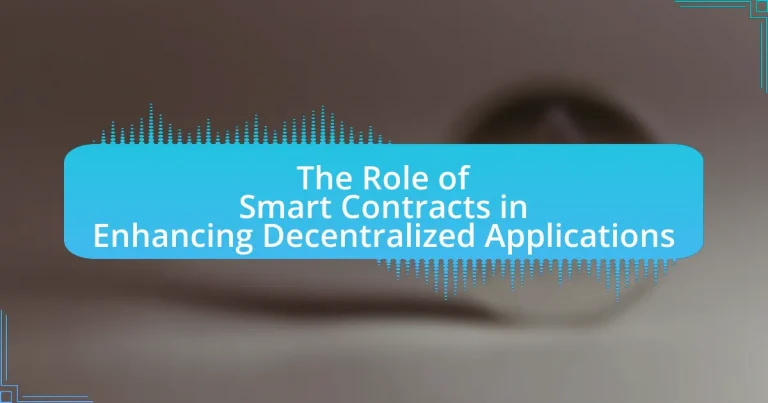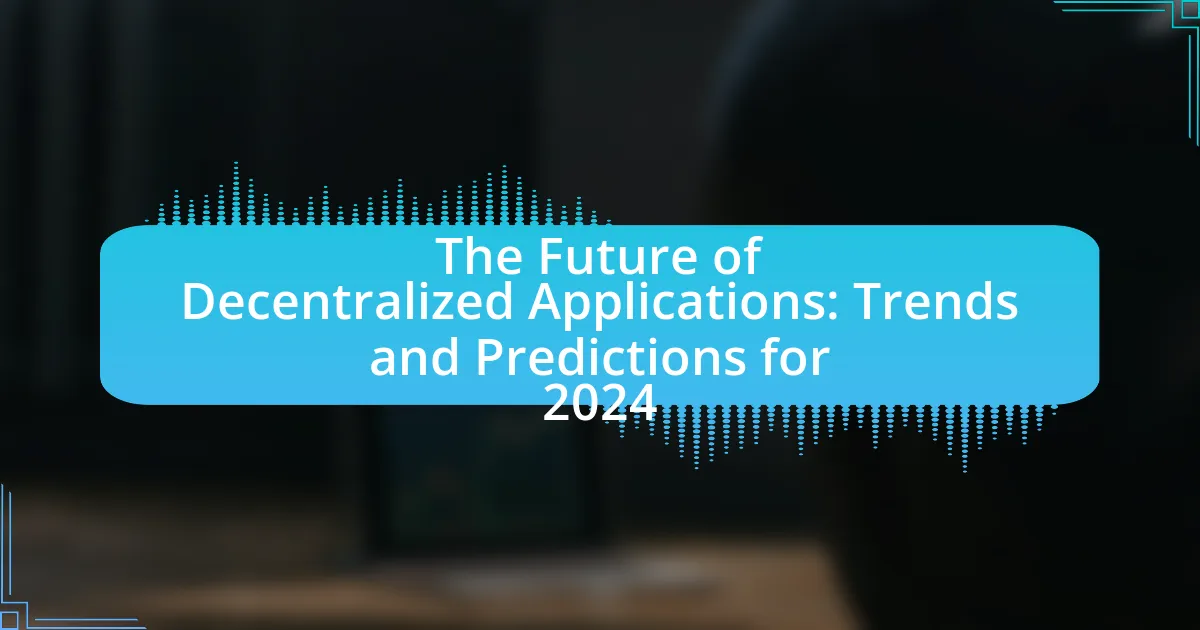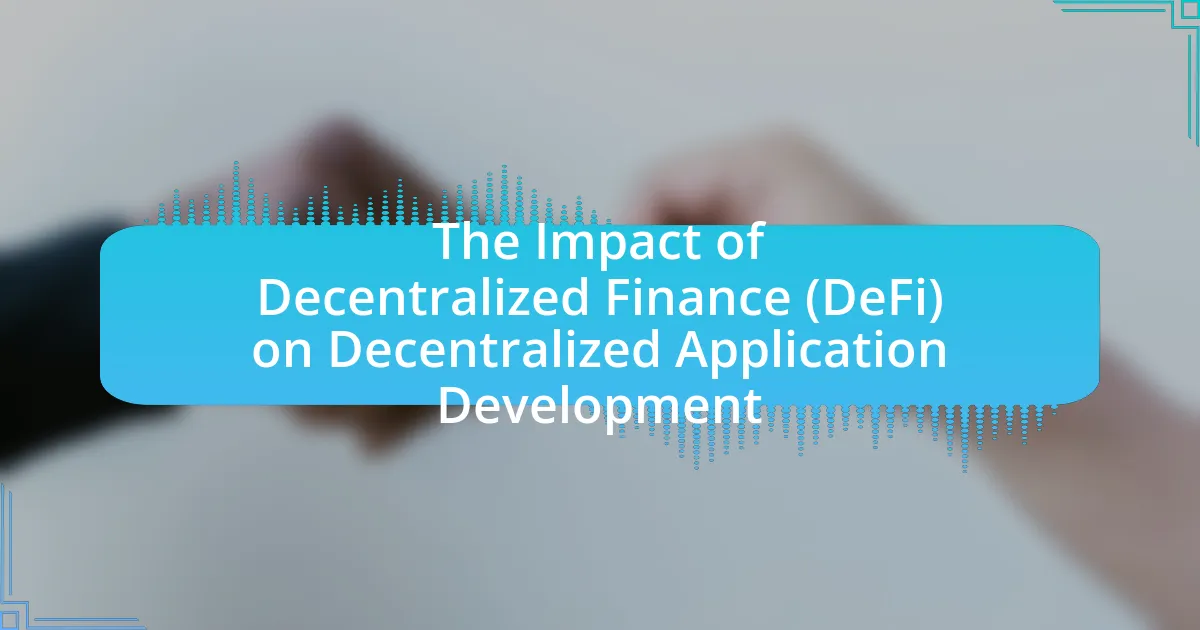Smart contracts are self-executing agreements coded on blockchain technology that facilitate, verify, and enforce contract terms without intermediaries, significantly enhancing the efficiency and security of decentralized applications (dApps). This article explores the functionality of smart contracts within dApps, their key components, and their interaction with blockchain technology. It highlights the advantages they provide, such as automation, transparency, and security, while also addressing challenges like security vulnerabilities and legal enforceability. Additionally, the article discusses best practices for developers, emerging use cases, and future trends that could shape the landscape of smart contracts in various sectors.
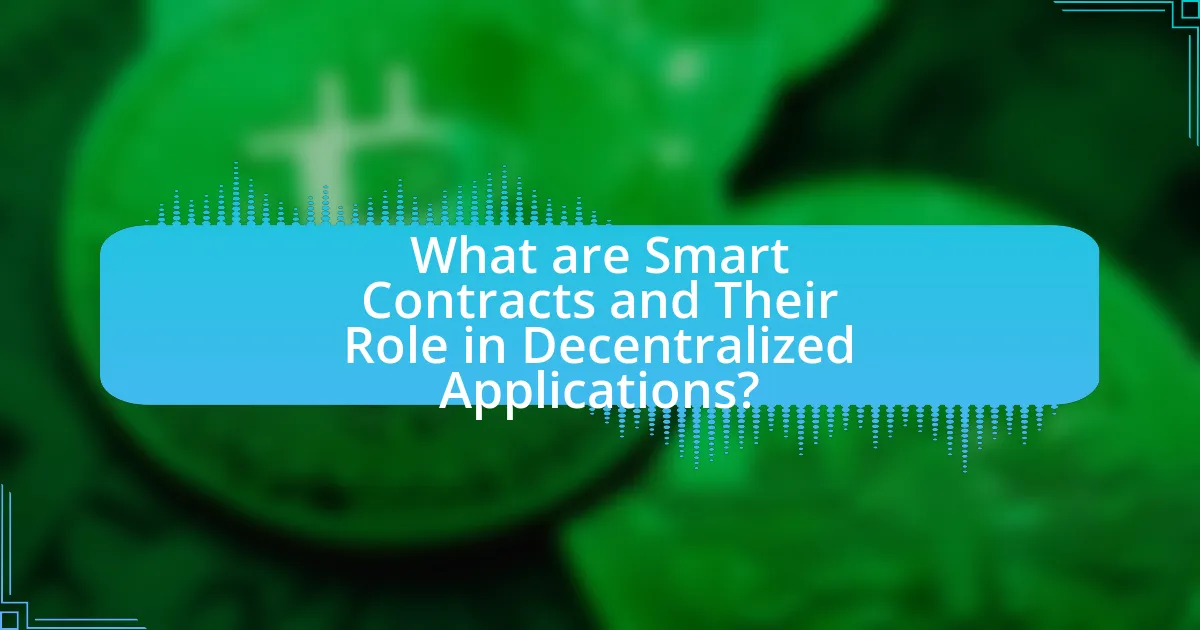
What are Smart Contracts and Their Role in Decentralized Applications?
Smart contracts are self-executing contracts with the terms of the agreement directly written into code, operating on blockchain technology. They facilitate, verify, and enforce the negotiation or performance of a contract without the need for intermediaries, thus enhancing the efficiency and security of decentralized applications (dApps). For instance, Ethereum, a leading blockchain platform, enables developers to create smart contracts that automate processes such as transactions and data exchanges, reducing the risk of fraud and increasing transparency. The use of smart contracts in dApps has been shown to streamline operations across various sectors, including finance, supply chain, and real estate, by ensuring that all parties adhere to the agreed-upon terms automatically.
How do Smart Contracts function within Decentralized Applications?
Smart contracts function as self-executing agreements with the terms directly written into code within decentralized applications (dApps). They automate processes by executing predefined actions when specific conditions are met, eliminating the need for intermediaries. For instance, in a decentralized finance (DeFi) application, a smart contract can automatically facilitate a loan by transferring funds once the borrower meets the collateral requirements. This functionality enhances transparency and trust, as all transactions are recorded on a blockchain, making them immutable and verifiable. The use of smart contracts in dApps has been validated by their widespread adoption in various sectors, including finance, supply chain, and gaming, demonstrating their effectiveness in streamlining operations and reducing costs.
What are the key components of Smart Contracts?
The key components of smart contracts include code, execution environment, and state. The code defines the rules and conditions of the contract, typically written in programming languages like Solidity for Ethereum. The execution environment, often a blockchain platform, facilitates the deployment and execution of the smart contract, ensuring that it operates in a decentralized manner. The state represents the current status of the contract, including variables and data that can change as the contract executes. These components work together to automate processes and enforce agreements without the need for intermediaries, enhancing the efficiency and reliability of decentralized applications.
How do Smart Contracts interact with blockchain technology?
Smart contracts interact with blockchain technology by executing self-executing agreements directly on the blockchain, which ensures transparency and immutability. These contracts are coded into the blockchain, allowing them to automatically enforce and execute terms when predefined conditions are met, without the need for intermediaries. For instance, Ethereum, a leading blockchain platform, enables developers to create smart contracts using its Solidity programming language, facilitating decentralized applications that operate securely and autonomously. This interaction enhances trust and efficiency in transactions, as the blockchain’s distributed ledger verifies and records all actions taken by the smart contracts, making them tamper-proof and publicly accessible.
What advantages do Smart Contracts provide to Decentralized Applications?
Smart contracts provide several advantages to decentralized applications (dApps), including automation, transparency, and security. Automation allows dApps to execute transactions and processes without human intervention, reducing the risk of errors and increasing efficiency. Transparency is achieved through the public nature of blockchain technology, enabling all participants to verify transactions and contract terms, which fosters trust among users. Security is enhanced as smart contracts are immutable and tamper-proof once deployed, protecting against fraud and unauthorized changes. These advantages collectively improve the functionality and reliability of decentralized applications, making them more appealing to users and developers alike.
How do Smart Contracts enhance security in Decentralized Applications?
Smart contracts enhance security in decentralized applications by automating and enforcing agreements without the need for intermediaries. This automation reduces the risk of human error and fraud, as the code executes predefined conditions transparently on the blockchain. Additionally, smart contracts are immutable once deployed, meaning that their terms cannot be altered, which protects against unauthorized changes. The use of cryptographic techniques ensures that transactions are secure and verifiable, further safeguarding user data and assets. According to a report by the World Economic Forum, smart contracts can significantly reduce transaction costs and increase trust among parties by providing a tamper-proof environment for executing agreements.
What efficiencies do Smart Contracts bring to transaction processes?
Smart contracts enhance transaction processes by automating execution, which reduces the need for intermediaries and minimizes transaction costs. This automation ensures that agreements are executed exactly as programmed, leading to increased efficiency and speed in transactions. For instance, a study by the World Economic Forum estimates that smart contracts could reduce transaction costs by up to 30% in certain industries by eliminating the need for manual processing and oversight. Additionally, smart contracts provide transparency and security through blockchain technology, which further streamlines the transaction process by ensuring that all parties have access to the same information and reducing the risk of fraud.

How do Smart Contracts improve user experience in Decentralized Applications?
Smart contracts enhance user experience in decentralized applications by automating processes and ensuring trustless interactions. They eliminate the need for intermediaries, which reduces transaction times and costs, thereby streamlining user interactions. For instance, a study by the World Economic Forum indicates that smart contracts can reduce transaction costs by up to 30% in certain sectors. Additionally, smart contracts execute predefined conditions automatically, providing users with transparency and security, as all actions are recorded on the blockchain. This reliability fosters user confidence, leading to increased adoption of decentralized applications.
What role do Smart Contracts play in automating processes?
Smart contracts automate processes by executing predefined agreements automatically when specific conditions are met. They eliminate the need for intermediaries, reducing time and costs associated with transactions. For example, in supply chain management, smart contracts can automatically trigger payments upon delivery confirmation, ensuring efficiency and transparency. This automation is supported by blockchain technology, which provides a secure and immutable record of transactions, further enhancing trust and reliability in decentralized applications.
How do Smart Contracts reduce the need for intermediaries?
Smart contracts reduce the need for intermediaries by automating and enforcing agreements directly between parties through code. This automation eliminates the necessity for third-party involvement, as smart contracts execute transactions and conditions autonomously once predetermined criteria are met. For instance, in financial transactions, smart contracts can facilitate payments without requiring banks or payment processors, thereby streamlining processes and reducing costs associated with intermediary fees. The transparency and immutability of blockchain technology further ensure that all parties can trust the execution of the contract without needing a mediator, as the terms are recorded and verifiable on the blockchain.
What impact do Smart Contracts have on transaction speed?
Smart contracts significantly enhance transaction speed by automating and executing agreements without the need for intermediaries. This automation reduces the time required for processing transactions, as smart contracts execute predefined conditions instantly upon meeting the criteria. For instance, transactions on platforms like Ethereum can be completed in seconds, compared to traditional systems that may take days due to manual processing and verification. The efficiency of smart contracts is evidenced by their ability to handle thousands of transactions per second, as seen in blockchain networks optimized for such operations.
How do Smart Contracts ensure transparency and trust in Decentralized Applications?
Smart contracts ensure transparency and trust in decentralized applications by executing predefined agreements automatically on a blockchain, which is an immutable ledger. This automation eliminates the need for intermediaries, reducing the risk of manipulation or fraud. Each transaction is recorded on the blockchain, making it publicly accessible and verifiable by all participants. For instance, Ethereum smart contracts allow users to verify the terms of agreements without relying on a central authority, thus fostering trust among users. The transparency of the blockchain ensures that all actions taken by the smart contract are visible and auditable, reinforcing accountability and trust in the system.
What mechanisms do Smart Contracts use to maintain transparency?
Smart contracts maintain transparency through mechanisms such as blockchain technology, public accessibility, and immutable records. Blockchain serves as a decentralized ledger where all transactions and contract executions are recorded, ensuring that any participant can verify the contract’s terms and outcomes. Public accessibility allows users to view the smart contract code and its transaction history, fostering trust among parties involved. Additionally, the immutable nature of blockchain means that once a smart contract is deployed, its code cannot be altered, preventing fraud and ensuring that all actions are traceable and accountable. These mechanisms collectively enhance the transparency of smart contracts in decentralized applications.
How do Smart Contracts build trust among users?
Smart contracts build trust among users by automating and enforcing agreements without the need for intermediaries. This automation ensures that the terms of the contract are executed exactly as programmed, reducing the risk of human error or manipulation. For instance, once a smart contract is deployed on a blockchain, it operates transparently and immutably, meaning that all parties can verify the contract’s terms and its execution in real-time. This transparency fosters confidence, as users can independently confirm that the contract will perform as expected. Additionally, the decentralized nature of blockchain technology means that no single party has control over the contract, further enhancing trust among users.
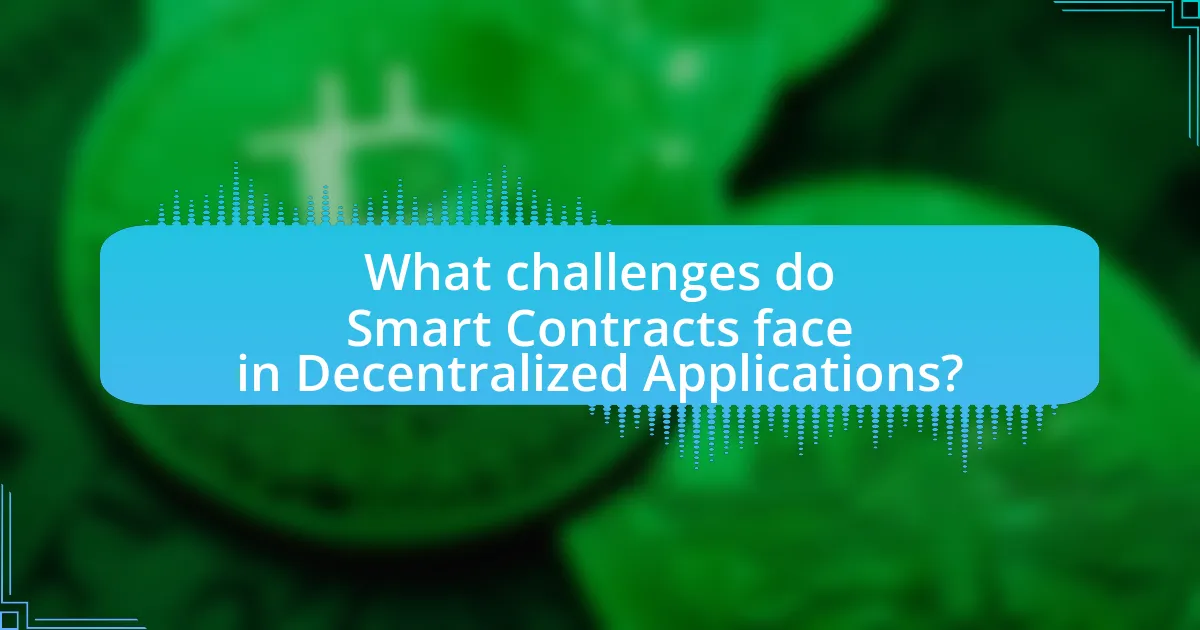
What challenges do Smart Contracts face in Decentralized Applications?
Smart contracts face several challenges in decentralized applications, including security vulnerabilities, scalability issues, and legal enforceability. Security vulnerabilities arise from coding errors or exploits, as evidenced by incidents like the DAO hack in 2016, where a flaw in the smart contract code led to the loss of $60 million in Ether. Scalability issues occur because many blockchain networks struggle to process a high volume of transactions quickly, which can hinder the performance of decentralized applications. Additionally, the legal enforceability of smart contracts remains ambiguous, as traditional legal systems may not recognize them, complicating dispute resolution and compliance with regulations. These challenges highlight the need for robust development practices, improved blockchain infrastructure, and clearer legal frameworks to enhance the effectiveness of smart contracts in decentralized applications.
What are the common vulnerabilities associated with Smart Contracts?
Common vulnerabilities associated with smart contracts include reentrancy, integer overflow and underflow, gas limit and loops, timestamp dependence, and improper access control. Reentrancy occurs when a contract calls another contract and allows the second contract to call back into the first contract before the first execution is complete, leading to potential exploitation. Integer overflow and underflow happen when arithmetic operations exceed the maximum or minimum limits of data types, causing unexpected behavior. Gas limit and loops can lead to transactions failing if they exceed the gas limit, while timestamp dependence can allow miners to manipulate contract behavior based on block timestamps. Lastly, improper access control can result in unauthorized users executing sensitive functions. These vulnerabilities have been documented in various incidents, such as the DAO hack in 2016, which exploited reentrancy, leading to a loss of $60 million in Ether.
How can coding errors affect Smart Contracts?
Coding errors can lead to significant vulnerabilities in Smart Contracts, resulting in financial losses and unintended behaviors. For instance, the infamous DAO hack in 2016, which exploited a coding flaw, resulted in the theft of $60 million worth of Ether. Such errors can allow malicious actors to manipulate contract functions, bypass security measures, or cause the contract to behave unpredictably, undermining the trust and reliability that Smart Contracts are designed to provide.
What are the implications of Smart Contract immutability?
Smart contract immutability implies that once a smart contract is deployed on a blockchain, its code cannot be altered or deleted. This characteristic ensures trust and reliability, as users can be confident that the contract will execute as originally programmed without interference. Immutability also poses challenges, such as the inability to correct bugs or vulnerabilities after deployment, which can lead to significant financial losses, as evidenced by incidents like the DAO hack in 2016, where a vulnerability in the smart contract code resulted in the loss of $60 million worth of Ether. Thus, while immutability enhances security and trust, it also necessitates rigorous testing and auditing before deployment to mitigate potential risks.
How can developers mitigate risks when using Smart Contracts?
Developers can mitigate risks when using smart contracts by implementing thorough testing, code audits, and using formal verification methods. Thorough testing involves creating extensive test cases to identify vulnerabilities before deployment, while code audits by third-party experts can uncover potential security flaws. Formal verification applies mathematical methods to prove the correctness of the smart contract’s logic, ensuring it behaves as intended. According to a study by the Blockchain Security Company, 70% of smart contract vulnerabilities can be identified through rigorous testing and audits, highlighting the effectiveness of these strategies in reducing risks.
What best practices should developers follow when writing Smart Contracts?
Developers should follow several best practices when writing Smart Contracts to ensure security, efficiency, and reliability. First, they must conduct thorough testing and audits to identify vulnerabilities, as evidenced by the numerous hacks and exploits in the blockchain space, such as the DAO hack in 2016, which resulted in a loss of $60 million due to a coding flaw. Second, developers should use established design patterns and libraries, like OpenZeppelin, which provide secure implementations of common functionalities, reducing the risk of errors. Third, they should minimize the complexity of contracts, as simpler code is easier to understand and audit, thereby decreasing the likelihood of bugs. Additionally, developers should implement proper access controls to prevent unauthorized actions, ensuring that only designated users can execute sensitive functions. Finally, they should document the code comprehensively, which aids in maintenance and future audits, as clear documentation can significantly reduce misunderstandings and errors in Smart Contract interactions.
How can thorough testing improve Smart Contract reliability?
Thorough testing improves Smart Contract reliability by identifying and mitigating vulnerabilities before deployment. Smart Contracts operate on immutable blockchain technology, meaning that any flaws can lead to irreversible financial losses or security breaches. Rigorous testing methods, such as unit testing, integration testing, and formal verification, ensure that the code behaves as intended under various scenarios. For instance, the DAO hack in 2016, which resulted in a loss of $60 million, highlighted the critical need for comprehensive testing to prevent similar incidents. By employing thorough testing protocols, developers can enhance the security and functionality of Smart Contracts, thereby increasing trust and adoption in decentralized applications.
What are the future trends for Smart Contracts in Decentralized Applications?
Future trends for smart contracts in decentralized applications include increased interoperability, enhanced security measures, and the integration of artificial intelligence. Interoperability will allow smart contracts to function across multiple blockchain platforms, facilitating seamless transactions and data sharing. Enhanced security measures, such as formal verification, will ensure that smart contracts are free from vulnerabilities, thereby increasing user trust. The integration of artificial intelligence will enable smart contracts to execute more complex logic and automate decision-making processes, improving efficiency and user experience. These trends are supported by ongoing developments in blockchain technology and the growing demand for decentralized solutions across various industries.
How might advancements in technology influence Smart Contracts?
Advancements in technology can significantly enhance the functionality and efficiency of Smart Contracts. For instance, improvements in blockchain scalability, such as Ethereum 2.0’s transition to proof-of-stake, can increase transaction speeds and reduce costs, enabling Smart Contracts to execute more complex operations in real-time. Additionally, the integration of artificial intelligence can facilitate automated decision-making within Smart Contracts, allowing them to adapt to changing conditions without human intervention. Furthermore, advancements in interoperability protocols can enable Smart Contracts to interact seamlessly across different blockchain networks, broadening their applicability and utility in decentralized applications. These technological improvements collectively enhance the reliability, speed, and versatility of Smart Contracts, making them more effective tools in decentralized ecosystems.
What potential new use cases for Smart Contracts are emerging?
Emerging use cases for smart contracts include decentralized finance (DeFi) applications, supply chain management, and digital identity verification. In DeFi, smart contracts automate lending, borrowing, and trading processes, enhancing efficiency and reducing reliance on intermediaries. In supply chain management, they enable real-time tracking of goods and automate payments upon delivery, increasing transparency and reducing fraud. For digital identity verification, smart contracts facilitate secure and verifiable identity management, allowing users to control their personal data while ensuring compliance with regulations. These use cases demonstrate the versatility and transformative potential of smart contracts across various sectors.
What practical tips can enhance the effectiveness of Smart Contracts in Decentralized Applications?
To enhance the effectiveness of Smart Contracts in Decentralized Applications, developers should prioritize thorough testing and auditing of the code. This practice minimizes vulnerabilities and ensures reliability, as evidenced by the high-profile hacks in the DeFi space, such as the $60 million hack of the bZx protocol in 2020, which highlighted the consequences of inadequate testing. Additionally, implementing clear and concise documentation improves user understanding and interaction with Smart Contracts, facilitating smoother integration and usage. Furthermore, utilizing established frameworks and libraries, like OpenZeppelin, can provide pre-audited components that reduce development time and enhance security. These strategies collectively contribute to the robustness and efficiency of Smart Contracts in decentralized ecosystems.












